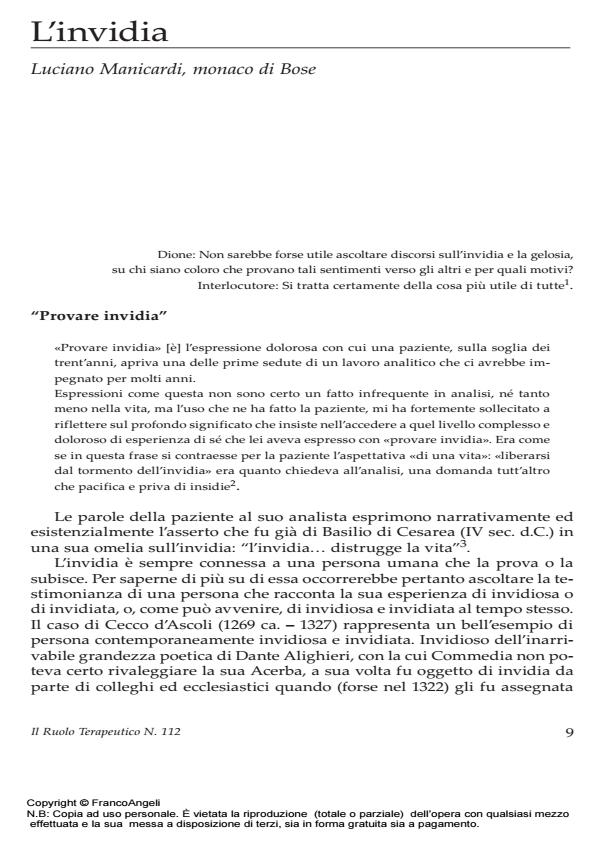L’invidia
Titolo Rivista RUOLO TERAPEUTICO (il)
Autori/Curatori Luciano Manicardi
Anno di pubblicazione 2009 Fascicolo 2009/112
Lingua Italiano Numero pagine 25 P. 9-33 Dimensione file 405 KB
DOI 10.3280/RT2009-112003
Il DOI è il codice a barre della proprietà intellettuale: per saperne di più
clicca qui
Qui sotto puoi vedere in anteprima la prima pagina di questo articolo.
Se questo articolo ti interessa, lo puoi acquistare (e scaricare in formato pdf) seguendo le facili indicazioni per acquistare il download credit. Acquista Download Credits per scaricare questo Articolo in formato PDF

FrancoAngeli è membro della Publishers International Linking Association, Inc (PILA)associazione indipendente e non profit per facilitare (attraverso i servizi tecnologici implementati da CrossRef.org) l’accesso degli studiosi ai contenuti digitali nelle pubblicazioni professionali e scientifiche
Envy - The author with extraordinary ability renders a delicate subject like envy accessible, defining a human experience as old as humankind. Traces are found in the oldest myths. The history of man is described in the Bible as a story of invidious personages. And like all that is human it is a fleeting and variegated reality. Since it cannot be declared, we can only look again at the traces that it left in literature, art and myths. Envy has to do with the experience of seeing. Etymologically it means looking sideways. The envious glance presents an aspect of illusion, both when it is directed at others and when it is directed at the self. Envy has to do with the experience of saying. It is not confessable. And slander is a way of destroying the envied one. It presents a constant characteristic: suffering, which pervades all of the relationships of the envious one who suffers for the happiness of others and takes malignant pleasure in others’ suffering. This prevents him from loving and being loved and conducts him inexorably to self impoverishment. Envy springs from a sense of lack whether real or perceived and from intolerance for ones own Copyright © FrancoAngeli N.B: Copia ad uso personale. È vietata la riproduzione (totale o parziale) dell’opera con qualsiasi mezzo effettuata e la sua messa a disposizione di terzi, sia in forma gratuita sia a pagamento. 30 Il Ruolo Terapeutico N. 112 limits. However, within envy positive factors can be hidden, like emulation and the desire to better oneself which must be worked through in order not to be perverted.
KEY WORDS: suffering, illusion, not confessable, slander, acceptance of limits
Luciano Manicardi, L’invidia in "RUOLO TERAPEUTICO (il)" 112/2009, pp 9-33, DOI: 10.3280/RT2009-112003